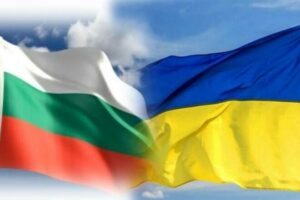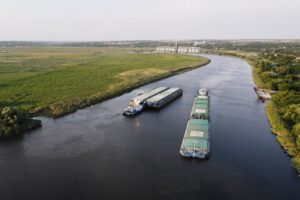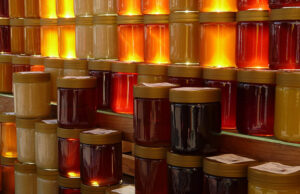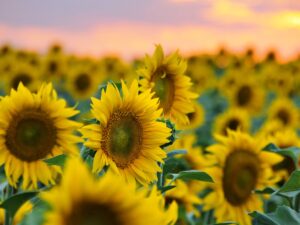

Bulgaria is perceived by Ukrainians mostly positively, although a significant number of citizens remain neutral. This is evidenced by the results of an all-Ukrainian survey conducted by Active Group in cooperation with the Experts Club information and analytical center in August 2025.
According to the survey, 44.3% of Ukrainians have a positive attitude towards Bulgaria (35.0% – mostly positive, 9.3% – completely positive). Only 3.7% of respondents expressed a negative attitude (2.7% – mostly negative, 1.0% – completely negative). At the same time, 48.7% of citizens are neutral, and 3.7% admitted that they do not know enough about this country.
“For Ukrainians, Bulgaria is not only an EU member state but also a significant economic partner. In the first half of 2025, the volume of bilateral trade amounted to more than $1.53 billion, of which Ukrainian exports amounted to $558.6 million and imports from Bulgaria amounted to almost $980 million. The negative balance of $421.5 million demonstrates an asymmetry in relations, but against the background of the total volume, it confirms the importance and sustainability of economic ties,” said Maxim Urakin, founder of Experts Club.
In his turn, Oleksandr Poznyi, co-founder of Active Group, drew attention to the fact that the sociological picture shows a friendly but at the same time restrained attitude of Ukrainians.
“Almost half of the citizens have a neutral position on Bulgaria, and this is due to the relatively limited presence of this country in the public and information space of Ukraine. At the same time, positive assessments outnumber negative ones by almost ten to one, which indicates the existence of trust and good potential for further development of relations,” he added.
The survey was part of a broader study analyzing international sympathies and antipathies of Ukrainians in the current geopolitical environment.
The full video can be viewed here:
https://www.youtube.com/watch?v=YgC9TPnMoMI&t
You can subscribe to the Experts Club YouTube channel here:
https://www.youtube.com/@ExpertsClub
ACTIVE GROUP, BULGARIA, DIPLOMACY, EXPERTS CLUB, Poznyi, SOCIOLOGY, TRADE, URAKIN

One of the largest grain market operators in Ukraine, Nibulon JV LLC, is entering new markets in the Middle and Upper Danube, expanding its operations in the region and offering a full cycle of grain and metal exports, as well as cargo transportation of all types of goods via the Danube, the grain trader’s press service reported on Facebook.
The agricultural holding reminded that the first steps in the Middle and Upper Danube markets were voyages with metal products on the routes Izmail – Lom (Bulgaria) and Izmail – Smederevo (Serbia), which were carried out by the tugs Pereyaslavsky and Kozatsky using barges of its own production. These shipments confirmed the company’s readiness to work efficiently with various categories of cargo, opening up new business opportunities in Bulgaria, Serbia, Romania and other countries in the Danube region.
“Our fleet is capable of transporting various types of cargo, and this is just the beginning. We offer comprehensive solutions to the Balkan business: grain exports combined with our logistics on the Danube to Constanta, as well as river transportation of any goods between the ports of the region,” said Sergey Kalkutin, Nibulon’s Logistics Director.
Nibulon assured that expansion to the Middle and Upper Danube is part of the agricultural holding’s long-term strategy aimed at developing international river logistics.
Currently, the agricultural holding is ready to offer a competitive alternative to traditional ways of supplying grain and other cargoes. This includes grain exports to 75 countries using its own river fleet, cargo transportation on the Danube for the agricultural, metallurgical and construction sectors, and flexible terms of cooperation: DAP, EXW, FCA, FOB, real-time online cargo tracking, international experience and reputation as a reliable partner.
“Thanks to its own modern fleet and efficient logistics, Nibulon guarantees stable and safe transportation on the Danube, which opens up access to new markets,” the agricultural holding emphasized.
Nibulon JV LLC was established in 1991. Prior to the Russian military invasion, the grain trader owned 27 transshipment terminals and crop reception complexes, facilities for simultaneous storage of 2.25 million tons of agricultural products, a fleet of 83 vessels (including 23 tugs), and the Mykolaiv Shipyard.
“Before the war, Nibulon cultivated 82 thousand hectares of land in 12 regions of Ukraine and exported agricultural products to more than 70 countries. In 2021, the grain trader exported the highest ever 5.64 million tons of agricultural products, reaching record volumes of supplies to foreign markets in August – 0.7 million tons, in the fourth quarter – 1.88 million tons, and in the second half of the year – 3.71 million tons.
Currently, the grain trader is operating at 32% of capacity, has set up a special unit to clear agricultural land of mines and had to move its headquarters from Mykolaiv to Kyiv.
BULGARIA, CARGO TRANSPORTATION, Danube, NIBULON, ROMANIA, SERBIA

Romania and Bulgaria joined the Schengen area on Wednesday, and starting January 1, 2025, border controls will be abolished on the land borders of these countries with and between the Schengen countries.
“Romania and Bulgaria, welcome to Schengen,” European Parliament President Roberta Mecola wrote on social media on the night of January 1.
“From now on, there will be no more checks when crossing the land borders between Bulgaria or Romania and any Schengen country,” the European Parliament’s social network X reported.
The European Parliament recalled that border checks for air and sea travel were canceled back in March 2024.
The European Commission’s Directorate-General for Migration and Home Affairs called 2025 a historic year for Romania, Bulgaria and its people. “Full accession to the Schengen area is in line with European promises and legitimate expectations. This marks an important milestone in our history,” the statement said.
As reported in the social media of Hungary’s X presidency of the EU Council on December 12, the interior ministers “have just decided to abolish control of internal land borders with and between Bulgaria and Romania as of January 1, 2025.” Austria had previously opposed this because of the high level of illegal migration in Bulgaria and Romania, but later lifted its veto.
The Schengen area is a European space where border controls at the internal border have been abolished. The accession of countries will promote travel, trade and tourism.
Source: http://relocation.com.ua/rumuniia-ta-bolhariia-ofitsijno-vstupyly-do-shenhenskoi-zony/

Bulgaria’s Minister of Agriculture and Food Georgi Takhov asked the European Commission to take safeguard measures against honey imports from Ukraine at a meeting of the EU Agriculture and Fisheries Council, and his request was supported by a representative of Romania, the Bulgarian Ministry of Agriculture reported.
According to Takhov, imports of Ukrainian honey make it difficult to sell local products. The fact is that significant volumes of Ukrainian honey entering the European market at very low prices put a lot of pressure on Bulgarian honey prices.
“In addition to the many challenges facing the industry, over the past three years it has also faced competition from imports from Ukraine. The volume of honey imported from Ukraine to our country from January to October 2024 increased by more than 30% compared to the same period last year,” Takhov emphasized and added that the high level of imports from Ukraine puts Bulgarian producers in a difficult situation.
At a press conference following the meeting of EU agriculture ministers, Hungarian Agriculture Minister Istvan Nagy explained that Bulgaria and Romania demanded safeguard measures for imports of honey from Ukraine to the European Union, as the duty-free quota set in the autonomous trade liberalization has been exhausted, and “the duty creates problems in domestic markets burdened by imports.”
“The measure – the so-called ATM regulation – has been exhausted, but the amount of honey coming from Ukraine is still subject to duty, which also creates problems in domestic markets that are burdened by imports,” the Hungarian Ministry of Agriculture quoted him as saying.
Nagy emphasized that effective measures should be taken to prevent counterfeit honey from entering the EU market, for example, by labeling and separating natural and non-natural honey. He also believes that it is necessary to compensate for the “emerging competitive disadvantages” and to further support the beekeeping sector.
As reported, on August 20, the European Commission imposed tariff quotas on Ukrainian honey due to the excess of quota-free volumes of its supplies to the European market. Imports of honey from Ukraine from the beginning of 2024 to August exceeded the quota of 44.418 thousand tons. Additional imports are subject to most favored nation (MFN) duties. In particular, a new tariff quota will be introduced from January 1, 2025, until June 5, 2025, which corresponds to 5/12 of the threshold set for the emergency braking. For honey, the new quota will amount to 18,507 tons.
From June 2, 2024 to June 5, 2025, the European Commission introduced quotas for the supply of eggs and sugar to the European Union. For eggs, the new quota is set at 9,662 thousand tons, and for sugar – at 109,44 thousand tons.
On May 13, 2024, the Council of the European Union approved the extension of temporary trade liberalization measures for Ukraine for another year, until June 5, 2025. At the same time, it was envisaged to apply an emergency braking mechanism for particularly sensitive agricultural products, including sugar, eggs, poultry, oats, corn, honey, and cereals, in case imports of these products in 2024 exceed the average volumes recorded in the second half of 2021 and during 2022 and 2023. Similar emergency braking measures may be applied in 2025 if, in the period from January 1 to June 5, 2025, the volume of Ukrainian exports exceeds 5/12 of the quota set for 2024.
According to Art. 4(7) of the Regulation on autonomous trade measures applicable to Ukrainian products, Ukraine will be able to supply to the EU from June 6, 2024 to June 5, 2025 without paying any duty 57,101 thousand tons of poultry meat, 9,662 thousand tons of eggs, 109,439 thousand tons of sugar, 18,507 thousand tons of honey, 4.648 million tons of corn, 1,017 thousand tons of oats, 8,603 thousand tons of cereals.

An earthquake with a magnitude of 5.3 occurred in Romania at 17:40 Kyiv time, with tremors also felt in the city of Odesa. According to the website of the European-Mediterranean Seismological Center, the epicenter was located in the Vrancha Zone in the Carpathians at a depth of 137 km.
Odesa Mayor Hennadiy Trukhanov reported no casualties or damage in the city.
“An earthquake with a magnitude of 5.3 occurred in Romania. It was felt in Bulgaria, Moldova and Ukraine, including Odesa. There was no information about damage or injuries in the city,” Trukhanov wrote on Telegram.
In local social media, users reported that the tremors were also felt in Mykolaiv, Zaporizhzhia, Kharkiv, Khmelnytskyi, Cherkasy, and Bila Tserkva in Kyiv Oblast.

Bulgaria is interested in importing sunflower seeds, wheat, corn and milk powder from Ukraine, said Nikolay Nenchev, Chargé d’Affaires of the Embassy of the Republic of Bulgaria in Ukraine, during a meeting with Taras Vysotsky, acting Minister of Agrarian Policy and Food of Ukraine.
According to the press service of the Ministry of Agrarian Policy and Food, Nikolay Nenchev assured that Bulgaria is ready to continue to help and cooperate with Ukraine, to facilitate the transit of Ukrainian agricultural products to the country’s seaports.
Vysotsky, for his part, noted that Ukraine highly appreciates cooperation with Bulgaria and its assistance in exporting agricultural products.
“Ukraine and Bulgaria have always had a constructive dialog on various issues. This contributes to the strengthening of bilateral relations between Ukraine and Bulgaria,” the acting minister summarized.